Module 4 Rules and suggestions Unit 1 You must be careful of falling stones课件(19张PPT,内嵌音频) 2021-2022
文档属性
| 名称 | Module 4 Rules and suggestions Unit 1 You must be careful of falling stones课件(19张PPT,内嵌音频) 2021-2022 |
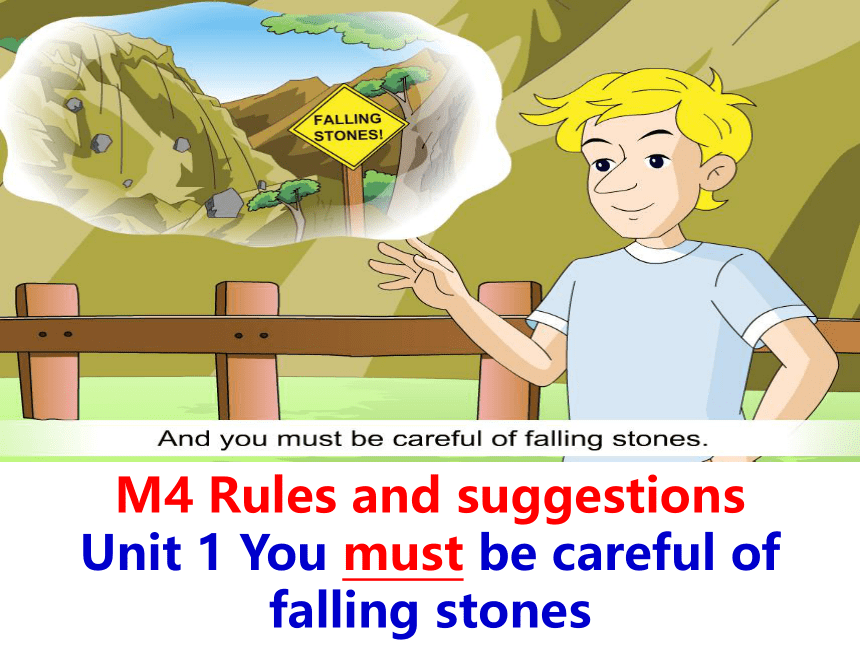
|
|
| 格式 | pptx | ||
| 文件大小 | 2.6MB | ||
| 资源类型 | 教案 | ||
| 版本资源 | 外研版 | ||
| 科目 | 英语 | ||
| 更新时间 | 2023-07-26 08:13:03 | ||
图片预览

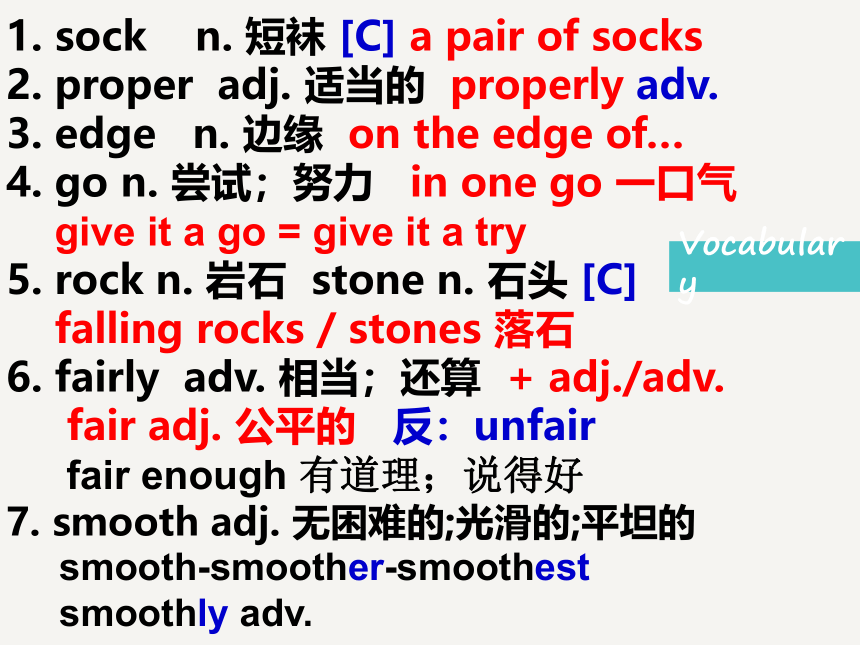

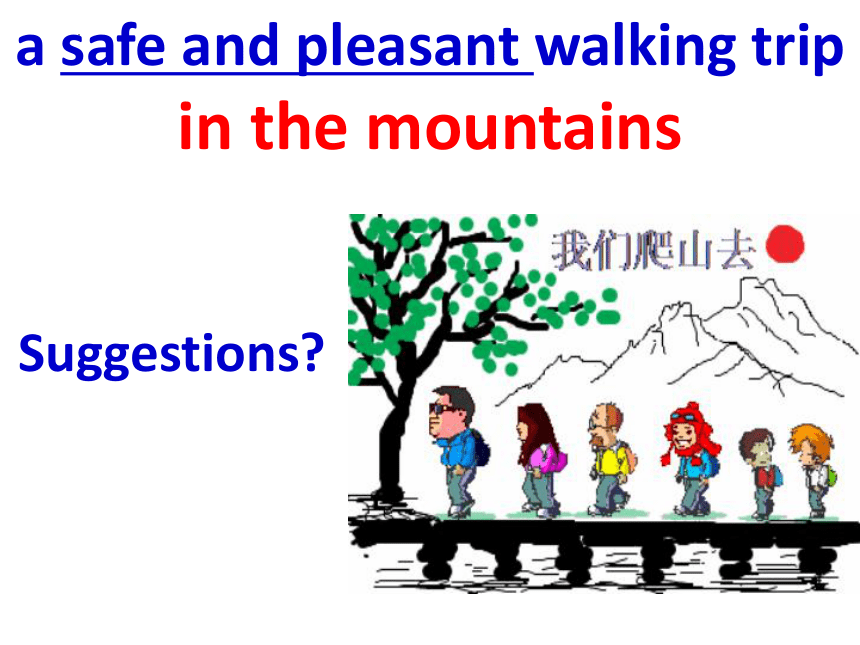
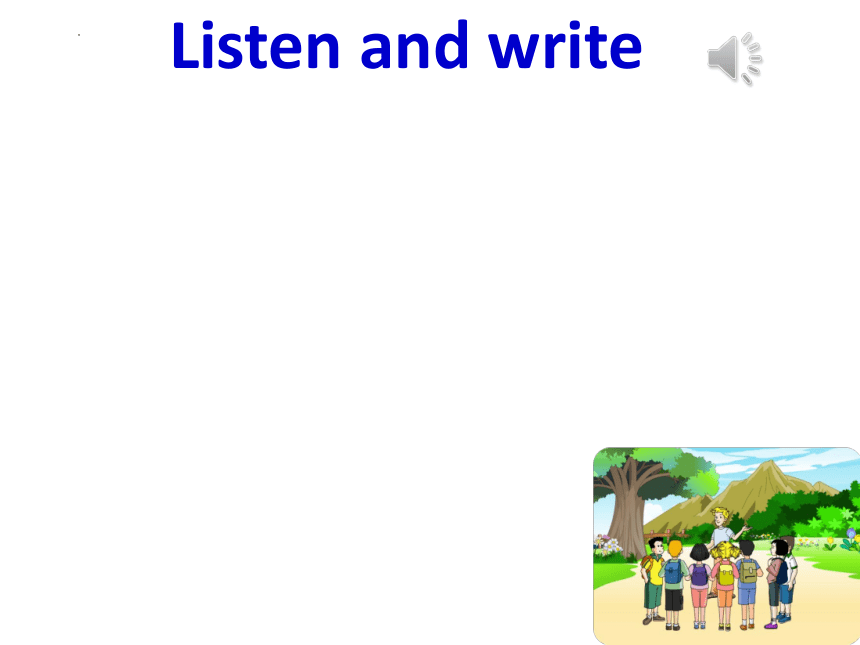
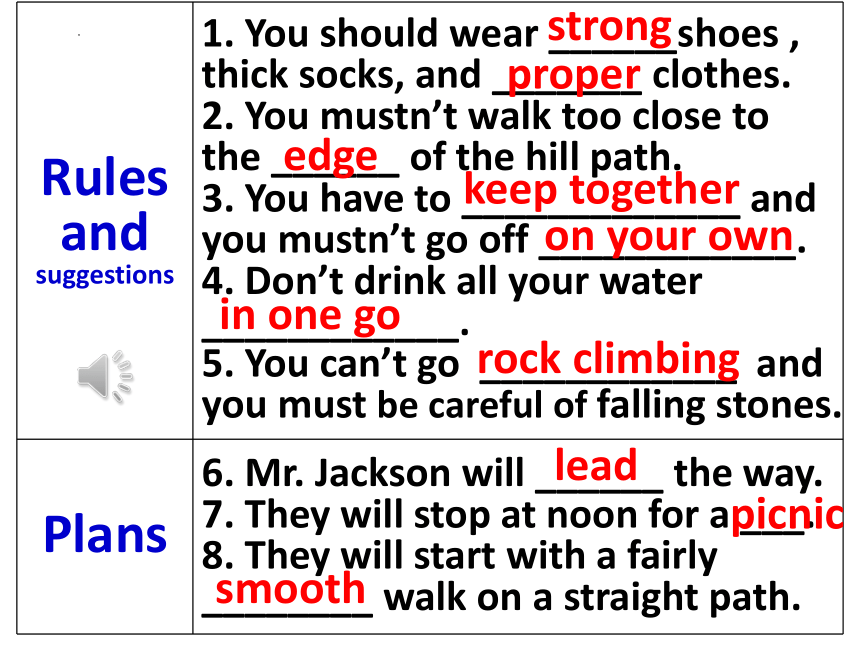
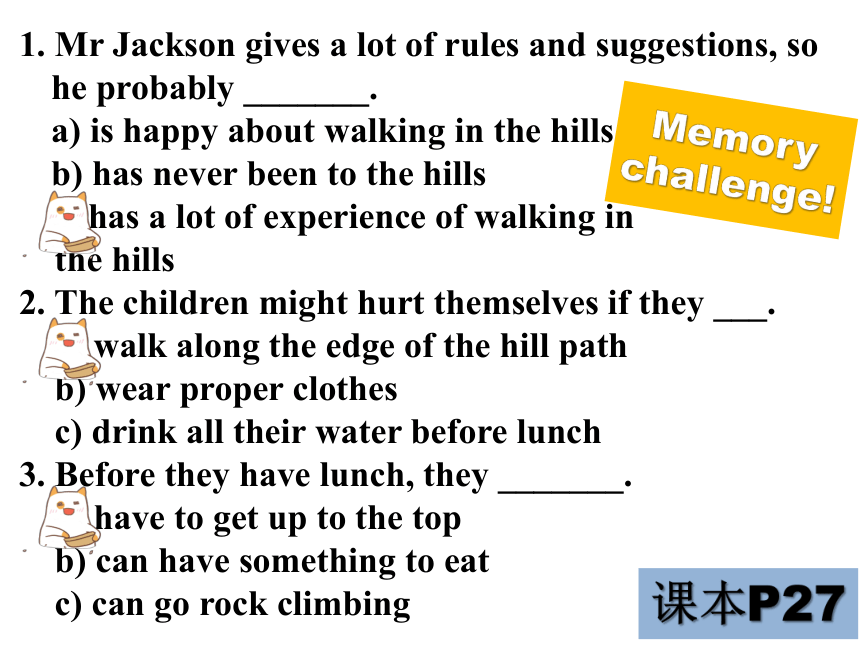
文档简介
(共19张PPT)
M4 Rules and suggestions
Unit 1 You must be careful of falling stones
Vocabulary
1. sock n. 短袜 [C] a pair of socks
2. proper adj. 适当的 properly adv.
3. edge n. 边缘 on the edge of…
4. go n. 尝试;努力 in one go 一口气
give it a go = give it a try
5. rock n. 岩石 stone n. 石头 [C]
falling rocks / stones 落石
6. fairly adv. 相当;还算 + adj./adv.
fair adj. 公平的 反:unfair
fair enough 有道理;说得好
7. smooth adj. 无困难的;光滑的;平坦的
smooth-smoother-smoothest
smoothly adv.
Quick check
1. I’m s_________. Have you got anything to eat
2. You need to wear p_______ clothes when you go hiking in the hills.
3. The process of studying is not always s__________ for everyone.
4. Drive s_________ on, and you’ ll find the museum on your left.
5. Your first novel was f______ well-written.
6. There is a knife on the e______ of the table.
7. He couldn’ t find his ________ (短袜)this morning.
straight
fairly
edge
socks
starving
proper
smooth
a safe and pleasant walking trip
in the mountains
Suggestions
Listen and write
Rules and suggestions 1. You should wear ______shoes , thick socks, and _______ clothes.
2. You mustn’t walk too close to the ______ of the hill path.
3. You have to _____________ and you mustn’t go off ____________.
4. Don’t drink all your water ____________.
5. You can’t go ____________ and you must be careful of falling stones.
Plans 6. Mr. Jackson will ______ the way.
7. They will stop at noon for a ___.
8. They will start with a fairly ________ walk on a straight path.
strong
proper
edge
keep together
on your own
in one go
rock climbing
lead
picnic
smooth
1. Mr Jackson gives a lot of rules and suggestions, so he probably _______.
a) is happy about walking in the hills
b) has never been to the hills
c) has a lot of experience of walking in
the hills
2. The children might hurt themselves if they ___.
a) walk along the edge of the hill path
b) wear proper clothes
c) drink all their water before lunch
3. Before they have lunch, they _______.
a) have to get up to the top
b) can have something to eat
c) can go rock climbing
Memory challenge!
课本P27
Exercises
Whenever
thick
smooth
straight
stones
1.请注意听一下
2.动身;出发
4.走得太靠近山路的边缘
5.必须在一起
6.迷路
7.单独离开
8. 一口气
9.去攀岩
10.小心滚落的石头
11.到达山顶
12.带路
13.一段相当顺利的徒步
14.以……开始
15.变得困难
Please pay attention for a moment
set off
walk too close to the edge of the hill path
have to keep together
get lost
go off on your own
in one go
go rock climbing
be careful of falling stones
get up to the top
lead the way
a fairly smooth walk
to begin with
get difficult
Language points
1. Before we set off, there are a few rules and suggestions for you.
在我们出发前,我要先讲几条纪律和建议。
set off最常用的意思有:出发,动身,启程。
set off for / to … 出发去…
你要是想赶上那班火车,咱们最好马上动身去火车站。
If you want to catch that train we’d better set off for the station immediately.
2. You mustn't go off on your own. 你们不许独自离开。
(1) go off 不及物动词短语,意为“离开”,常指为了某个目的而悄悄离去。
Mr. Smith went off in a hurry.
He went off to drink water. 他离开去喝水了。
【拓展】
go off 还可表示“突然发出响声;(电灯)熄灭;(水电)中断;(食物或饮料)变质,变坏”等。
I woke up when my alarm clock went off.
The lights went off. 灯灭了。
The heating goes off at night. 暖气夜间停止供热。
The food goes off quickly in summer.
2. You mustn't go off on your own. 你们不许独自离开。
(2) (all) on one’s own
单独;独自 = alone
I went to the cinema on my own because all my friends were very busy.
独立地 (without help)
You must do your homework on your own.
拓展:of one’s own “某人自己的”
Mr Wang built the house on his own, and now he has a house of his own.
3. OK, whenever you go walking in the hills, you should always wear proper clothes. 好的,无论什么时候去山里徒步旅行,你们总是应该穿着合适的衣服。
whenever连词,意为“每当;无论什么时候”,引导让步状语从句,相当于no matter when+从句。
Whenever I meet her, I say hello to her.
= No matter when I meet her, I say hello to her.
每当我见到她,我都向她问好。
starve动词,意为“挨饿;饿死”。
adj. starving饥肠辘辘的
常用短语:starve to death“饿死”;
be starved of“渴望得到,急需”。
The poor dog often starves because food is hard to find. 这只可怜的狗经常挨饿,因为很难找到食物。
Millions of people starved to death during the war. 战争期间数百万人饿死了。
The schools in the mountains are starved of good teachers. 山区的学校急需好老师。
4.I'm starving! 我都快饿死了!
5.It should be a fairly smooth walk to begin
with because it’s a straight path, but it’ll start to get difficult soon.
to begin with “起初;开始”
We will go slowly to begin with.
拓展:begin with / begin… with… 以..开始
(2) straight adj. “笔直的” 意思拓展“平正的;整洁的;坦诚的;非此即彼的”
He drew a straight line.
It took hours to get the house straight.
拓展:还可作adv. “笔直地;平直地;成直线”
He was too tired to walk straight.
搭配: straight forward 直截了当的
straight away 马上
Exercises
1. You _____ touch an electric fire. It’s dangerous.
A. need B. must C. needn’ t D. mustn’ t
2. Don’ t worry. I can deal with it _____ my own. I don’ t need any help.
for B. on C. with D. of
3. You must be careful when you swim _____ the river.
A. across B. below C. over D. through
4. —Do you have any plans for this summer holiday
—I’ m not sure. I _____ take a trip to Taiwan.
A. must B. need C. may D. should
5. Emma looked after her pet dog ____ of all her friends.
A. careful B. most careful
C. more carefully D. the most carefully
Exercises
6. —I am really tired of my English. Could you please give me a _____
—Oh, I think the language doctor can give you some good _____.
A. advice; suggestions B. suggestion; advices
C. suggestion; advice D. advice; suggestion
7. Please pay close attention to _____ the teacher in class if you want to make progress.
A. listening B. listening to C. listen D. listen to
8. _____ I am in trouble, my friends will help me out.
A. Before B. Whenever C. Although D. Wherever
9. _____ attend the meeting, she _____ early in the morning.
A. In order that;set off B. In order to;put off
C. In order that;put off D. In order to;set off
10. If you keep to the main road, you won’ t _____.
go off B. get lost
C. pass away D. lose yourself
Exercises
Exercises
1. 你们一定要小心落石。
You must ______________ falling stones.
2. 你坐得离电视机太近了,这对你的眼睛不好。
You are _________________ the TV, and it’ s bad for your eyes.
3. 出发前,我们会打包好我们的衣物。
We’ ll pack our clothes before ____________.
4. 无论何时你有麻烦,都可以向我求助。
You can ask me for help_________________.
5. 上周六,他独自一人去攀岩。
He went rock climbing __________________ last Saturday.
be careful of
sitting too close to
setting off
whenever you are in trouble
on his own /
by himself / alone
M4 Rules and suggestions
Unit 1 You must be careful of falling stones
Vocabulary
1. sock n. 短袜 [C] a pair of socks
2. proper adj. 适当的 properly adv.
3. edge n. 边缘 on the edge of…
4. go n. 尝试;努力 in one go 一口气
give it a go = give it a try
5. rock n. 岩石 stone n. 石头 [C]
falling rocks / stones 落石
6. fairly adv. 相当;还算 + adj./adv.
fair adj. 公平的 反:unfair
fair enough 有道理;说得好
7. smooth adj. 无困难的;光滑的;平坦的
smooth-smoother-smoothest
smoothly adv.
Quick check
1. I’m s_________. Have you got anything to eat
2. You need to wear p_______ clothes when you go hiking in the hills.
3. The process of studying is not always s__________ for everyone.
4. Drive s_________ on, and you’ ll find the museum on your left.
5. Your first novel was f______ well-written.
6. There is a knife on the e______ of the table.
7. He couldn’ t find his ________ (短袜)this morning.
straight
fairly
edge
socks
starving
proper
smooth
a safe and pleasant walking trip
in the mountains
Suggestions
Listen and write
Rules and suggestions 1. You should wear ______shoes , thick socks, and _______ clothes.
2. You mustn’t walk too close to the ______ of the hill path.
3. You have to _____________ and you mustn’t go off ____________.
4. Don’t drink all your water ____________.
5. You can’t go ____________ and you must be careful of falling stones.
Plans 6. Mr. Jackson will ______ the way.
7. They will stop at noon for a ___.
8. They will start with a fairly ________ walk on a straight path.
strong
proper
edge
keep together
on your own
in one go
rock climbing
lead
picnic
smooth
1. Mr Jackson gives a lot of rules and suggestions, so he probably _______.
a) is happy about walking in the hills
b) has never been to the hills
c) has a lot of experience of walking in
the hills
2. The children might hurt themselves if they ___.
a) walk along the edge of the hill path
b) wear proper clothes
c) drink all their water before lunch
3. Before they have lunch, they _______.
a) have to get up to the top
b) can have something to eat
c) can go rock climbing
Memory challenge!
课本P27
Exercises
Whenever
thick
smooth
straight
stones
1.请注意听一下
2.动身;出发
4.走得太靠近山路的边缘
5.必须在一起
6.迷路
7.单独离开
8. 一口气
9.去攀岩
10.小心滚落的石头
11.到达山顶
12.带路
13.一段相当顺利的徒步
14.以……开始
15.变得困难
Please pay attention for a moment
set off
walk too close to the edge of the hill path
have to keep together
get lost
go off on your own
in one go
go rock climbing
be careful of falling stones
get up to the top
lead the way
a fairly smooth walk
to begin with
get difficult
Language points
1. Before we set off, there are a few rules and suggestions for you.
在我们出发前,我要先讲几条纪律和建议。
set off最常用的意思有:出发,动身,启程。
set off for / to … 出发去…
你要是想赶上那班火车,咱们最好马上动身去火车站。
If you want to catch that train we’d better set off for the station immediately.
2. You mustn't go off on your own. 你们不许独自离开。
(1) go off 不及物动词短语,意为“离开”,常指为了某个目的而悄悄离去。
Mr. Smith went off in a hurry.
He went off to drink water. 他离开去喝水了。
【拓展】
go off 还可表示“突然发出响声;(电灯)熄灭;(水电)中断;(食物或饮料)变质,变坏”等。
I woke up when my alarm clock went off.
The lights went off. 灯灭了。
The heating goes off at night. 暖气夜间停止供热。
The food goes off quickly in summer.
2. You mustn't go off on your own. 你们不许独自离开。
(2) (all) on one’s own
单独;独自 = alone
I went to the cinema on my own because all my friends were very busy.
独立地 (without help)
You must do your homework on your own.
拓展:of one’s own “某人自己的”
Mr Wang built the house on his own, and now he has a house of his own.
3. OK, whenever you go walking in the hills, you should always wear proper clothes. 好的,无论什么时候去山里徒步旅行,你们总是应该穿着合适的衣服。
whenever连词,意为“每当;无论什么时候”,引导让步状语从句,相当于no matter when+从句。
Whenever I meet her, I say hello to her.
= No matter when I meet her, I say hello to her.
每当我见到她,我都向她问好。
starve动词,意为“挨饿;饿死”。
adj. starving饥肠辘辘的
常用短语:starve to death“饿死”;
be starved of“渴望得到,急需”。
The poor dog often starves because food is hard to find. 这只可怜的狗经常挨饿,因为很难找到食物。
Millions of people starved to death during the war. 战争期间数百万人饿死了。
The schools in the mountains are starved of good teachers. 山区的学校急需好老师。
4.I'm starving! 我都快饿死了!
5.It should be a fairly smooth walk to begin
with because it’s a straight path, but it’ll start to get difficult soon.
to begin with “起初;开始”
We will go slowly to begin with.
拓展:begin with / begin… with… 以..开始
(2) straight adj. “笔直的” 意思拓展“平正的;整洁的;坦诚的;非此即彼的”
He drew a straight line.
It took hours to get the house straight.
拓展:还可作adv. “笔直地;平直地;成直线”
He was too tired to walk straight.
搭配: straight forward 直截了当的
straight away 马上
Exercises
1. You _____ touch an electric fire. It’s dangerous.
A. need B. must C. needn’ t D. mustn’ t
2. Don’ t worry. I can deal with it _____ my own. I don’ t need any help.
for B. on C. with D. of
3. You must be careful when you swim _____ the river.
A. across B. below C. over D. through
4. —Do you have any plans for this summer holiday
—I’ m not sure. I _____ take a trip to Taiwan.
A. must B. need C. may D. should
5. Emma looked after her pet dog ____ of all her friends.
A. careful B. most careful
C. more carefully D. the most carefully
Exercises
6. —I am really tired of my English. Could you please give me a _____
—Oh, I think the language doctor can give you some good _____.
A. advice; suggestions B. suggestion; advices
C. suggestion; advice D. advice; suggestion
7. Please pay close attention to _____ the teacher in class if you want to make progress.
A. listening B. listening to C. listen D. listen to
8. _____ I am in trouble, my friends will help me out.
A. Before B. Whenever C. Although D. Wherever
9. _____ attend the meeting, she _____ early in the morning.
A. In order that;set off B. In order to;put off
C. In order that;put off D. In order to;set off
10. If you keep to the main road, you won’ t _____.
go off B. get lost
C. pass away D. lose yourself
Exercises
Exercises
1. 你们一定要小心落石。
You must ______________ falling stones.
2. 你坐得离电视机太近了,这对你的眼睛不好。
You are _________________ the TV, and it’ s bad for your eyes.
3. 出发前,我们会打包好我们的衣物。
We’ ll pack our clothes before ____________.
4. 无论何时你有麻烦,都可以向我求助。
You can ask me for help_________________.
5. 上周六,他独自一人去攀岩。
He went rock climbing __________________ last Saturday.
be careful of
sitting too close to
setting off
whenever you are in trouble
on his own /
by himself / alone
同课章节目录
- Module 1 Travel
- Unit 1 We toured the city by bus and by taxi
- Unit 2 It's a long story.
- Unit 3 Language in use
- Module 2 Education
- Unit 1 They don't sit in rows.
- Unit 2 What do I like best about school?
- Unit 3 Language in use
- Module 3 Life now and then
- Unit 1 They sometimes work harder.
- Unit 2 I think life is better today.
- Unit 3 Language in use.
- Module 4 Rules and suggestions
- Unit 1 You must be careful of falling stones.
- Unit 2 we must keep the camp clean.
- Unit 3 Language in use.
- Revison A
- Module 5 Look after yourself
- Unit 1 We'd better get you to hospital.
- Unit 2 Get off the sofa!
- Unit 3 Language in use.
- Module 6 Eating togethe
- Unit 1 When is the school-leavers' party?
- Unit 2 Knives and forks are used for most Western
- Unit 3 Language in use
- Module 7 English for you and me
- Unit 1 Have you ever been to an English corner?
- Unit 2 We all own English.
- Unit 3 Language in use
- Module 8 My future life
- Unit 1 Here's to our friendship and the future
- Unit 2 I know that you will be better at maths.
- Unit 3 Language in use
- Revison B
